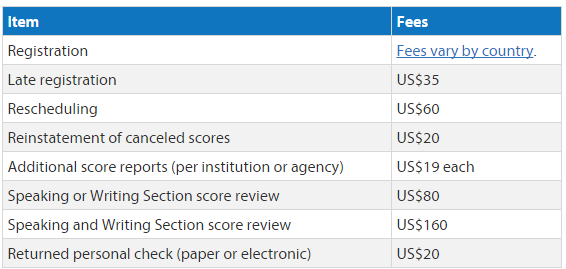[LISTENING (Part 2)]
This time I will teach you how to go about everyday practice if you do not attend cram school.
1. Everyday acuity and focus in listening comprehension
Think about the time we have spent studying English in the past. We have probably all attended English classes since junior high school or even elementary school! If every word is disassembled or written out, most people would surely understand their meaning; then why is it that the sound of spoken words often makes our thoughts wander, rendering us unable to comprehend?
When our ears are not accustomed to hearing certain words, we will not actively identify these words the first time we hear them. I suggest that you listen to some  videos that are short but require a high degree of focus, such as TED Talks, which cover different specific fields, to try to identify those words that you already know. Trust me, the parts you do not understand will definitely not exceed 50% of the entire talk and for those of you who possess a solid foundation, perhaps only a few vocabulary words will present difficulty. Your brain has the knowledge, you just need to let your ears adapt, because otherwise you will be stuck in a situation of no comprehension ability.
videos that are short but require a high degree of focus, such as TED Talks, which cover different specific fields, to try to identify those words that you already know. Trust me, the parts you do not understand will definitely not exceed 50% of the entire talk and for those of you who possess a solid foundation, perhaps only a few vocabulary words will present difficulty. Your brain has the knowledge, you just need to let your ears adapt, because otherwise you will be stuck in a situation of no comprehension ability.
A simple example is the iPhone function Siri; there is a multitude of built-in Siri responses in an iPhone—Siri can even search relevant information on the Internet—but when Siri hears you speak, she doesn’t necessarily comprehend what is being said and is thus unable to respond accurately. This doesn’t mean that Siri cannot solve our problem, only that she does not know what we are expressing and is unable to produce the appropriate response as a consequence. Siri’s database is analogous to our brain; we actually understand a lot but the voice recognition system is just like the ears, it is not necessarily able to perfectly identify the meaning that each sound represented, and thus it fails to clearly grasp the meaning. Therefore, this type of practice is increasing the acuity of our own voice recognition system! At the same time, you can choose fields that are of interest to you to keep up your motivation and enthusiasm to practice every day.
2. Ability to take notes and see the big picture
 In the listening comprehension test, you will be given a piece of paper to write down the things you hear. This will not be difficult for those who usually take notes in their professors’ lectures, however, you should remember that the time to take notes will be limited. Therefore, you should organize the way you are accustomed to taking notes and the abbreviations you know, as this can greatly increase your note-taking speed! (e.g., tomorrow – tmrw; message – msg.. . etc.)
In the listening comprehension test, you will be given a piece of paper to write down the things you hear. This will not be difficult for those who usually take notes in their professors’ lectures, however, you should remember that the time to take notes will be limited. Therefore, you should organize the way you are accustomed to taking notes and the abbreviations you know, as this can greatly increase your note-taking speed! (e.g., tomorrow – tmrw; message – msg.. . etc.)
So what does seeing the big picture mean? It means extracting the overall summary; when you have finished listening, can you point out the main important points? I trust that everyone could easily grasp these tips and now you need to acquire this ability yourself! I suggest that you practice by using your notes to retell the content of the video you just listened to, be it short or long. When you can state the content clearly, this is an indication that you have understood. (This is somewhat similar to the speaking practice, which will be mentioned later on).
What if it’s really too hard and I can’t see the big picture? Don’t worry if what you don’t understand in the TOEFL listening comprehension test are the difficult terminologies (here, reiterating again the importance of improving your acuity in listening comprehension!); don’t let that terminology scare you! Most test questions will include times, places, or other significant information, and these words you will certainly know! So, keep up with the rhythm and be sure to write down information that has “content”! Otherwise, you will easily forget it.
3. Interactive and in-depth critical thinking
Do you know how to be flexible? You cannot always be in a state of tension, or you will slack; conversely, a lack of stimulation will gradually make you rust.
Many people have asked me, isn’t turning on CNN or tuning in English-speaking radio programs enough to practice my listening skills? I once visited the home of my graduate school senior, whose television was always turned on CNN. As he was sweeping the floor, I heard a news report about Iraq and asked for his thoughts. It turned out that he actually wasn’t listening very carefully and I had to wait a while for him to finish listening before he could discuss the matter with me.

This is the mistake that most people often make; if you choose news or other information-dense material, please focus, or you will get nothing. This type of in-depth listening exercise is necessary because you need to reflect at the same time as you listen; if you can understand the speaker’s perspective as well as reflect and provide different views, this means that you really possess in-depth listening skills! However, like I said, very deep contents can easily make you feel fatigued and you will not be able to keep practicing for a long time. Therefore, you can combine these exercises with light and funny series such as 2 Broke Girls or music that you enjoy to improve your acuity for everyday language!
If you have friends near you who are relatively good at speaking, or if you have foreign friends (there will be many exchange students at every university), both everyday chatting and discussions on particular subjects (one deep and one shallow) will help you improve substantially! After all, this is just like muscle training in fitness, simply doing intensive training will not produce great results and neither will excessively light training; instead, the two must be combined.

4. Familiarize yourself with the question type and catch the errors
I think I am already familiar with the test questions and I am bound to succeed! When you practice using TPO you will feel like you know which parts of the test topics that the questions will be selected from and you will naturally pay special attention to those parts. However, you may also encounter blind spots and be unable to identify the problem.
When you finish the listening comprehension exercises and revise the results and look at what information you missed, here are a couple of reasons of why you might not have initially been able to answer the questions correctly.
A) You didn’t see the big picture: If the question you were unable to answer was a conceptual question, like the main meaning or conclusion of the speech, you may need to improve your summarization skills and your ability to see the big picture. After you have finished listening to an English lecture or a spoken passage in a video, remember to force yourself to summarize it and retell the main contents to yourself. This will help you acquire the skill of organizing the main points.
B) You didn’t memorize a particular detail: A speech will typically contain numerous details, and although you may remember them all at first you may soon discover that you can’t remember everything, and you may even miss the very detail that is asked for in the question. As I mentioned previously, use the practice questions to get the hang of it; people, events, times, places, things as well as “what,” “where,” “when,” “how,” reason and cause, are details that will help you catch the meaning and they are also the most frequent test questions.
C) You misunderstood the question or the speaker’s meaning: When you listen, you may think that you remember your notes clearly and also understood the question, so why did you still get it wrong? Most of the people I have met failed to hear co-articulated words that convey the meaning “not” (e.g. can’t/can) or were unsure of the meaning of transition words (e.g. yet, nonetheless, unless, etc.). Identifying the words or semantics that you are unfamiliar with or that you find unclear will enable you to resolve them easily next time you come across them!
If you put in regular effort and master the techniques for answering questions, your listening comprehension performance will become better and better! I hope that none of you will be afraid of listening comprehension anymore, everybody do your best!





 rom Asian countries all have one very cute characteristic; we care a lot about the impression we make! We’re afraid of asking the wrong question or saying the wrong thing, and as a result we don’t dare express our opinions without first rehearsing them a hundred times in our minds to make sure there is nothing wrong with them. But, my dears, this is an English proficiency test, not a lecture.
rom Asian countries all have one very cute characteristic; we care a lot about the impression we make! We’re afraid of asking the wrong question or saying the wrong thing, and as a result we don’t dare express our opinions without first rehearsing them a hundred times in our minds to make sure there is nothing wrong with them. But, my dears, this is an English proficiency test, not a lecture.







 The TOEFL Listening section is divided into two parts. Each part has a conversation and two lectures. Listening time for each section is approximately 20 minutes, and the answer time is 10 minutes. Therefore, each part takes approximately 30 minutes overall.
The TOEFL Listening section is divided into two parts. Each part has a conversation and two lectures. Listening time for each section is approximately 20 minutes, and the answer time is 10 minutes. Therefore, each part takes approximately 30 minutes overall.
